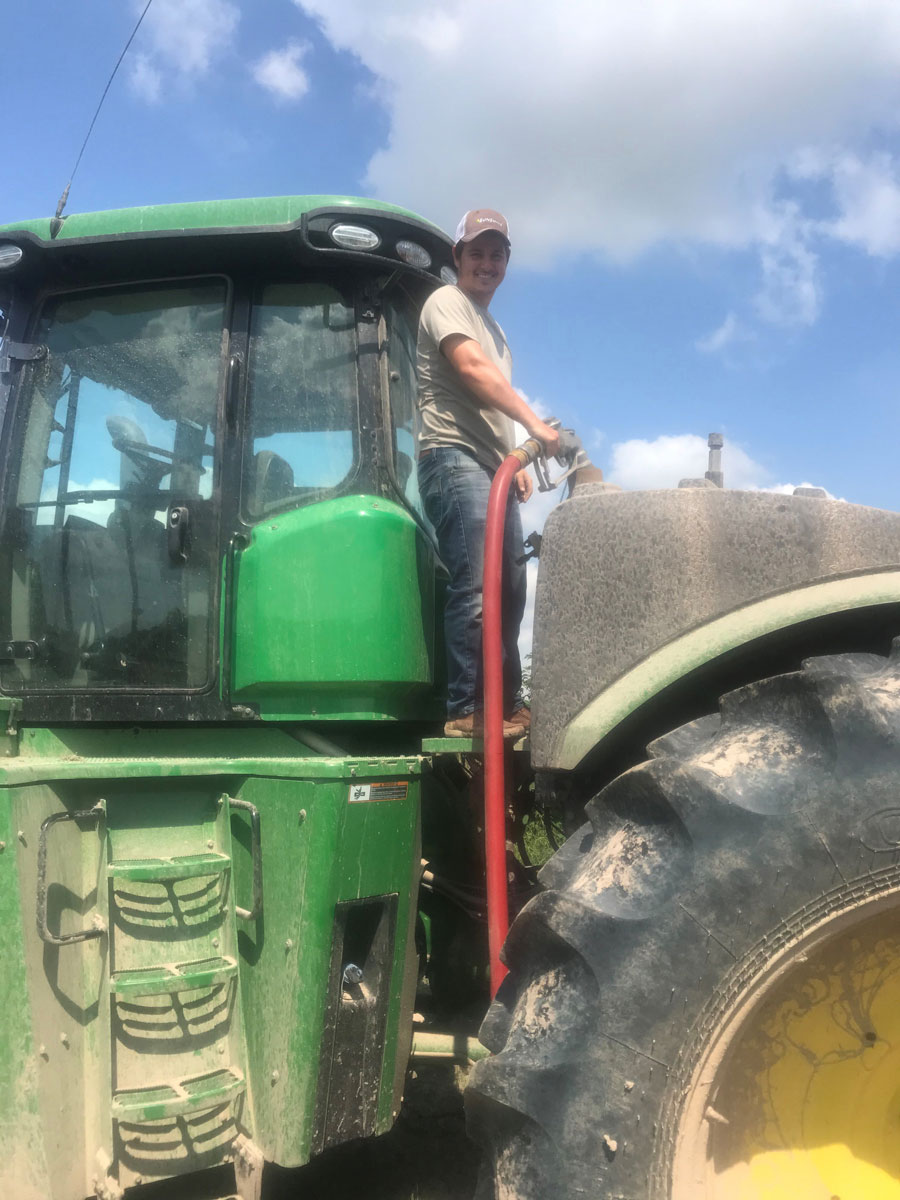 Cicero Manenti fuels up at the McLain farm in Abbeville LA
Cicero Manenti fuels up at the McLain farm in Abbeville LA
Jul 07, 2020
ABBEVILLE, LA -- Cícero Marcon Manenti has known he wanted to take on the family rice farm since he was ten years old.
“When I was a kid, I was always out with my dad in the tractor, planting and harvesting. I decided to study agronomy because I wanted to farm with my dad,” said Manenti.
After graduating in 2019 with a degree in agronomy from Universidade Federal de Santa Catarina in southern Brazil, Manenti decided he wanted to spend some time abroad learning about other rice farming methods before heading back to his family’s operation near Turvo, a small city in Santa Catarina. Manenti’s father, who is president of the rice farming co-op in Turvo, is friends with Richard Bacha, former director of the Agricultural Research and Rural Extension Company of Santa Catarina (EPAGRI), who in turn knows USA Rice’s very own Dr. Steve Linscombe, director of The Rice Foundation.
Manenti’s interest in learning about U.S. rice farming made its way through the grapevine to Louisiana rice farmer Allen McLain, and he jumped at the opportunity to invite Manenti to stay at the McLain family farm in Abbeville for the summer.
“Steve contacted me and said that they had a young guy down in Brazil who wanted to come and learn about rice production in the U.S., to enhance his rice farming skills, and observe the growing season into the harvest for a couple months,” said McLain. “And I thought, great! We can always use more help on the farm.”
Manenti arrived in mid-March, and since then he’s been accompanying McLain daily out on the farm, learning how they do rice in Louisiana. For the most part, rice farming in Brazil and rice farming in the U.S. is pretty similar, according to Manenti – with one big exception.
“The way they use water here is different than what we have in Brazil,” said Manenti. “We don’t have water available to put in the field. We rely on rain, and it’s hard. Last year, in 2019, we had a big problem with water. We couldn’t plant. All that is different here.”
McLain has been more than happy to show Manenti all the benefits of his water systems.
“Every day he goes out and makes sure all the water is good,” said McLain. “I tell him to start the pump, and it boggles his mind that he can just flip a switch and water is on the field. He was very impressed that you could mark it on a calendar, like every five days it will rain no matter what.”
Manenti is also eager to learn how McLain and other U.S. rice farmers deal with an old foe: red rice. The weed has been present in Brazilian rice farms for decades, but recently has grown resistant to treatments and become more of a problem. Manenti wants to apply his newfound knowledge on his family’s farm when he returns to Turvo in early August.
One unexpected obstacle in Manenti’s stay has been COVID-19. He is unfortunately unable to do any sightseeing, but it hasn’t stopped him from getting to experience some Louisiana culture.
“My first week here I ate some crawfish,” says Manenti. “We don’t have crawfish in Brazil, and I’d never seen one before.”
In the meantime, he’s perfectly happy to stay on the farm and keep learning and observing. It’s also given him a chance to work on his English – which has made excellent progress – and for McLain to try out his own language skills.
“For the first two weeks, Siri had no idea why I was speaking so much Portuguese,” said McLain.
When Manenti returns to Turvo, it will be just in time for Brazil’s planting season, and he’s eager to implement what he’s learned this summer. But he hopes this won’t be his last visit to the U.S.
“I’m really enjoying everything here, and I plan to be back. The people in Louisiana are so cool and helpful. I don’t know how to say it…”
“Hospitable?” McLain offered.
Manenti laughed. “Yes, in Portuguese it’s almost the same word. I’d like to return next year to see Allen’s family again. I hope I get to come back.”